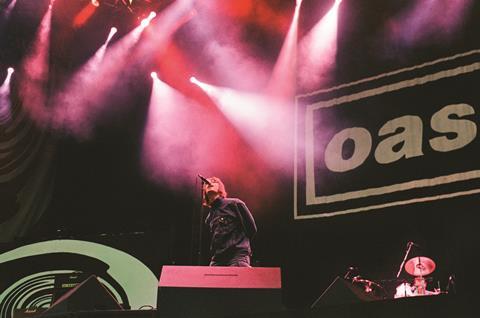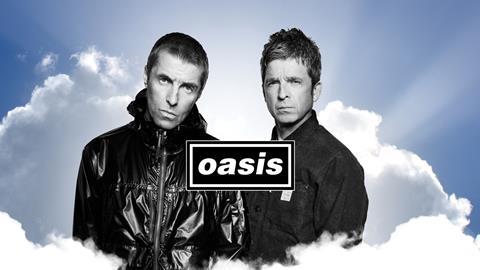The fans who thought they’d never see Oasis rise from the dead are desperate to see the band recapture their earlier form. The story of two warring brothers is as old as the scriptures, says Martin Saunders
Knebworth Park, Hertfordshire, 10 August 1996. The summer sun beats down in a country pregnant with hope and growing self-belief, on a crowd bristling with excitement and anticipation. More than 100,000 people are gathered in the grounds of this famous old stately home, all of them carrying a sense that history is about to be made. All of us, I should say.
The details of the day are etched on my memory. My best friend, Hakan, and I woke early, waited at the huge, makeshift gates and, as soon as they creaked open, completed a death-defying sprint to the front of the stage. We stood on the same spot for nearly twelve hours; surviving dehydration only through the kindness of stewards handing out tiny cups of water. We danced, sang and celebrated our coming of age to some of the biggest and best bands of the time: the Manic Street Preachers, The Chemical Brothers, The Prodigy. And then, as night drew in, the main event. The biggest band in the country – or as they would tell us, the world – took to the stage with a customary swagger. Post-Euro ’96 euphoria met pre-New Labour expectation, and the lead singer of Oasis sent me, Hakan and the crowd into raptures with a single line: “Knebworth, mad for it, yeah?”
Britain in the 90s was a wild train ride of self-confidence and optimism. The Spice Girls, Richard Curtis romcoms, globally recognised fashion designers and a fresh-faced Tony Blair were all prominent passengers, but there was no real doubt about who was in the driving seat. Liam and Noel Gallagher were brothers with mercurial talent, no shortage of ambition and a bristling confidence which summed up the mood of a nation. Their two shows at Knebworth House in the summer of 1996 crowned them as the all-conquering rock stars at the very heart of Cool Britannia.
The Oasis reunion is a redemption story but it’s a fragile one, because it’s still the story of human beings trying to force broken pieces together
But nothing mortal lives forever. Just four years later, as national optimism dimmed and friction between the brothers began to create increasing sparks, I stood with the same friend and watched the wheels come off. At a now infamous Wembley gig, singer Liam arrived drunk; the pair argued on stage, and Noel – who usually only provided backing vocals on most songs – was forced to finish the concert alone after his brother stormed off. The newspapers went mad for it. The fans knew it was the beginning of the end.
Although Oasis limped along for nine more years, releasing a string of fairly unremarkable albums along the way, they never managed to recapture the swaggering genius of their early moment in the sun. The deepening rift between the brothers widened; the band split up in 2009 and the Oasis story came to a sputtering end.
Until, in the summer of 2024, an unexpected announcement emerged.
Don’t look back in anger
So here we are. A cultural phenomenon that once hogged, then lost the spotlight has suddenly and dramatically managed to regain it. A once unthinkable reunion has been heralded. Oasis will play 19 UK stadium shows in 2025, and that number is vulnerable both to expansion and possible implosion. Demand for tickets is far outstripping supply, with websites crashing as dates sold out within minutes. So why have the Gallagher brothers put their well-documented differences aside to tour again…and why does everyone seem so electrified by it?
Initial excitement around the tour was dampened slightly once the prices were announced. For many concertgoers, the already steep £150 price tag for a standing ticket doubled, due to so-called ‘dynamic pricing’. It wasn’t long before accusations of greed and fan exploitation emerged. Still, every date filled up almost instantly.
There are many possible reasons why, even at inflated prices (my ticket to Knebworth ’96 cost £22.50), the Oasis reunion tour has proved impossible for fans to resist. For a start, those of us who followed the band fanatically in the 1990s have more disposable income than we did back then. There’s also the complex sense of nostalgia associated with the band and the period of musical and cultural history that they occupied, a time when Britain seemed to be undergoing a transformation, where things could only get better.
Perhaps, more than anything, there’s just the irresistible intrigue of the key relationship at the heart of the band. Love and anger; talent and foolishness; great drama is driven by conflict, and Oasis has always had plenty. Perhaps brother stories always do.

Guess God thinks I’m Abel
The Bible has plenty of incidences of brotherly relationships, and almost all of them seem to be packed with conflict. The story of Cain and Abel, memorably referenced by Liam in the song ‘Guess God thinks I’m Abel’, ends in the latter’s murder. Jacob – himself the centre of a brotherly controversy (see Genesis 25 and 27) – has a tribe of sons who throw their most popular member into a pit and sell him into slavery (Genesis 37). Even Jesus’ imagined parable characters – the prodigal son and his steady-Eddie sibling – are caught in conflict over the injustice of their seemingly unequal treatment (Luke 15:11-32). These are, perhaps not coincidentally, some of the most memorable and well-known stories in the biblical library; familiar even to those with little theological exposure. We seem to find fraternal fragility utterly fascinating.
Liam and Noel Gallagher’s own story echoes some of these biblical narratives. They lean on the closeness of their family bond, but it also seems to be the very thing that drives them apart. Of course, we only see a version of the truth, one that may have been choreographed from within or warped from outside. But it has always seemed that as older brother Noel tried to keep the show on the road, the more impulsive Liam would both cause havoc and claim the seemingly unfair reward of the centre-stage. He’s part prodigal, part Joseph in his technicolour dreamcoat. In turn, Noel becomes the resentful older brother; the wrathful Cain. Like those siblings in the Bible, the Gallaghers are a pair of brothers living through their own epic tragedy and discovering that they need something bigger than each other.
All of these brother stories, both ancient and modern, are reminders that we can’t do it on our own; that even in the context of the closest, blood-bonded human relationship, we can’t quite achieve harmony, conquer the temptations of vaulting ambition or even demonstrate perfect love to one another. Cain and Jacob steal life and opportunity from their brothers. The older son just can’t be happy for his younger sibling’s return. Liam and Noel Gallagher tried to keep their band together and achieve increasing musical greatness, but their broken humanity kept getting in the way. All of these stories show us that we need someone else to repair and redeem us; a different kind of brother-figure to drag us out of the repeating cycles in which we find ourselves.
Hebrews 2:11 says: “Both the one who makes people holy and those who are made holy are of the same family. So Jesus is not ashamed to call them brothers and sisters”. Through the cross, Jesus makes an invitation of cosmic brotherhood; to become a part of his family. This is the only redemption story that actually works, and it’s a story of brotherly redemption. Perhaps that’s why, as a culture, we seem to yearn for it.
The gospel according to Oasis
Oasis’ lyrics, all of them now at least 15 years old, never tended towards overt Christian or religious themes. Yet many of their songs echo spiritual desires which chime with a New Testament worldview of longed-for redemption and ultimate hope. Here are just a few examples.
‘Stop crying your heart out’
With its recurring plea not to be scared, this 2002 track hints at some grand redemption after death. Liam reassures us: “Cause all of the stars are fading away / Just try not to worry, you’ll see them someday.”
‘Wonderwall’
In interviews, Noel has explained that the title of perhaps their most famous song describes “an imaginary friend who’s gonna come and save you from yourself”. The Christian would simply suggest that this friend is not imaginary…
‘Don’t look back in anger’
The band’s greatest anthem is a call to peace, forgiveness and reconciliation. After the horrific Manchester Arena terrorist attack in May 2017, the song became a “hymn of defiance”, according to Noel.
‘The masterplan’
Originally intended as a B-side but eventually becoming the title of an entire album, this epic ballad is the closest Noel ever gets to acknowledging something bigger then himself. He takes on vocal duties and declares: “There’s four and twenty million doors / On life’s endless corridor…We’re all part of a masterplan.”
‘Some might say’
One of the band’s most iconic lines is also perhaps their most theological: “Some might say they don’t believe in heaven / go and tell it to the man who lives in hell.” Perhaps, after all, the band are aware that their antics, and their inability to live in peace, might carry some kind of eternal consequences.
Maybe you’re gonna be the one that saves me
That yearning is never more present than in the Oasis reunion. Noel and Liam want it to work, if only because of the financial rewards; the fans who thought they’d never see Oasis rise from the dead are desperate to see them recapture the form of summer ’96. Just as we’re drawn in by conflict, we’re wired to love reconciliation. Of course we want the volatile combination to finally create perfect alchemy; for Noel and Liam to put their long-held differences aside, make more great music and entertain crowds for years to come – however unlikely that may be.
Through the cross, Jesus makes an invitation of cosmic brotherhood
Human beings are created with an innate sense of hope. We want all things to be reconciled in the end, whether that’s on a grand scale or in the petty squabbling of sibling rivalry. We also know that we don’t possess the power within ourselves to mend the broken world we live in. For that, we need Jesus, our brother.
The Oasis reunion is a redemption story but it’s a fragile one, because it’s still the story of human beings trying to force broken pieces together, and hoping they’ll somehow stick. The band never sang much about God, but one of their most famous early songs suggests that the eternal things, the things that really do bring change and reconciliation, are both elusive and hoped for. Noel places these words into Liam’s mouth, and in an iconic pose he muses: “Maybe I just want to fly / I want to live, I don’t want to die / Maybe I just want to breathe / Maybe I just don’t believe / Maybe you’re the same as me / We see things they’ll never see / You and I are gonna live forever.”
Oasis have grasped at greatness, at eternal significance and, in their own inimitable way, I’m certain they believe they’ve already reached it. But the fact that they’ve reformed now only illustrates that, deep down, the Gallagher brothers know they have unfinished business. They want to achieve harmony, put differences aside and do the things they were put on earth to do. Yet there’s an in-built sense that, even in the attempt, it will fall short, that it needs help; that human brotherly love isn’t quite enough. Mortal things don’t live forever.








































No comments yet